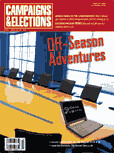

Sometime in the mid-1990s I was asked to speak at a conference on immigration issues. The audience consisted of non-profit immigration policy advocates, grassroots immigrant organizing groups, and their funders, reps from some of the big foundations, including Ford and George Soros' Open Society Institute. I was supposed to talk about immigrants and elections.
First I spent a morning listening to other presenters. Now the rule at these dog and pony shows, when funders are present, is that everyone is accomplishing great things. So I heard a litany of tales (probably true, but likely exaggerated) about wonderful policy changes by city councils and about how little community organizations took on the man and won.
Then I got up. I waved a copy of Campaigns and Elections magazine and asked: "How many of you read this? How many of you have heard of this?" It came as no surprise that no one had.
Campaigns and Elections is the professional journal of electoral consultants, data vendors, election paraphernalia hucksters, and nowadays internet solutions purveyors. It is not about partisanship; it is about how to make a buck off the US form of democracy. And though much of it is lightweight back slapping and in-group self-congratulation, it does contain occasional useful tips on how to win elections. So I read it. Regularly. And if the kind of authentic grassroots organizations I was talking to want to win, they need to be aware of the world of Campaigns and Elections as well.
Ever wondered what election consultants do in the off-season? After all, even when there are no candidates to sell to the public, there is office overhead and salaries to pay. Very often they sell clients what they call "grassroots lobbying." Less kindly, those of us who actually organize people (instead of money) call this "Astroturf."
When all those well meaning non-profit advocacy groups I was talking to go to press their case with their city council or their congressperson, more and more they find themselves up against Astroturf opponents: phony "organizations" often with no more real existence than a mail drop (such as a political consultant's office) and some big donations from businesses or other deep pocket interests who need a little manufactured populist credibility for their issues.
Recently a particularly egregious scam of this nature came to light in California. State legislators were besieged by an outfit calling itself "California Senior Action Network" that supported pro-business positions, including weakening a bill that aimed to stop financial abuse of elders. Yes, this was an Astroturf group, set us with contributions of tens of thousands of dollars from trade groups for the building industry and real estate, and an insurer, 21st Century Insurance. But the scam was particularly notable because it had usurped the name of a well-known grassroots coalition representing 30,000 older people, the Senior Action Network of San Francisco. And the story just gets better:
Among the people said to be involved with the California Senior Action Network is Bruce Young, a former state assemblyman who was sent to federal prison in the 1980s after being convicted of failing to report personal income and laundering campaign contributions. …
"It's deliberately concocted to appear as though they're a statewide version of us," said David Grant, the director of health policy for the San Francisco-based Senior Action Network. "It couldn't be worse from our point of view. It's completely the opposite of anything Senior Action Network stands for."
The San Francisco group's executive director, Bruce Livingston, sent a letter to state Assembly Speaker Fabian Núñez on Thursday asking him and members of the lower house not to mistake the two groups. "We will not and have never acted at the behest of business interests or corporate donors," the letter said.
So okay, there are a lot of phony, consultant-enriching Astroturf organizations on the loose, but what has that got to do with the "revolutions" in the title?
US political consultants have gone international, plying their trade of elections for profit throughout the world. In a sense this is simply the privatization of what we've known for years that the CIA was doing covertly: making sure that forces allied with US interests had whatever they needed to win. Still, it is a little disconcerting to find a prominent article in the February Campaigns and Elections on how a US political consultancy played an important role in Ukraine's "Orange Revolution." Aristotle International, the consulting firm involved, proudly describes itself as a "bipartisan company [that] supplies strategic and public affairs technology to elected officials, political parties and Fortune 1000 companies worldwide."
Lucrative work I'm sure, but not much like democracy or revolution.
No comments:
Post a Comment